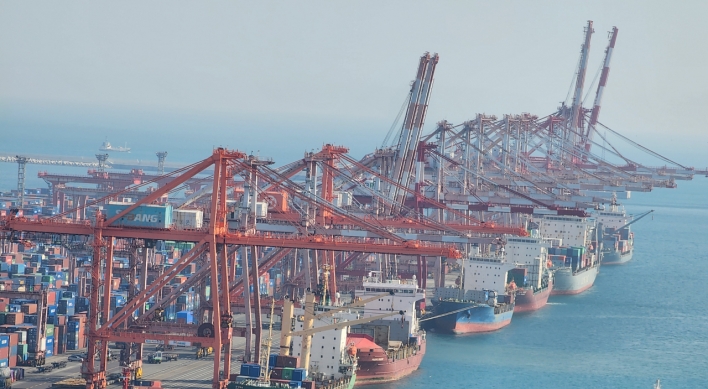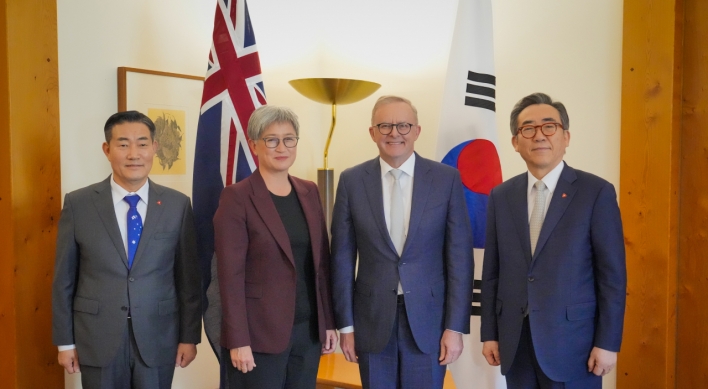Cheap yen poses threat to exporters
IT, automobiles vulnerable to won’s rise: HERI report
By Kim Yon-sePublished : Jan. 20, 2013 - 20:07
The Korean won strengthening against major currencies is estimated to undermine exports from the information technology and automobile industries, a private research institute said Sunday.
In particular, the Japanese yen’s weaker position against the won was identified as a serious threat to the price competitiveness of Korea’s IT and car producers by Hyundai Economic Research Institute.
While the two sectors are the nation’s top growth engines, HERI estimated that Korea sees a drop in product exports by 0.87 percent and 0.68 percent, respectively, in the IT and automobiles when the yen falls by 1 percent against the won.
Samsung Electronics and Hyundai Motor have been in heavy competition with Japanese players in overseas markets in terms of price competitiveness as well as product quality.
Further, other sectors such as petrochemical, steel and machinery are expected to suffer heavier falls in export performance under the strong won against the yen, HERI added.
The U.S. dollar closed at 1,057.2 won last Friday, losing ground by 7.5 percent against the Korean currency from 1,143 won a year earlier. On a monthly basis, the greenback also slid 1.5 percent from 1,073.5 won on Dec. 18, 2012.
In contrast, the dollar gained against the yen by 16.2 percent over the past year.
As a result, the Japanese currency depreciated sharply from 1,489 won to 1,181 won per 100 yen over the corresponding period.
Citing data from the Bank of Korea, the institute also projected that Korea will see its gross domestic product fall by 0.92 percent when the won appreciates by 1 percent against the yen.
A 10 percent rise in the exchange rate is translated into a 2.1 percent jump in export prices of the nation’s industrial goods, according to HERI.
When calculating this in recent exports, major items ― handsets, semiconductors and cars ― saw their profitability worsen by 4.4 percent, 0.7 percent and 0.1 percent, respectively.
Theoretically, unfavorable economic indices invite currency depreciation.
But the current won-dollar exchange rates reflect “the dominant market projections that the won’s rally will go on for the time being,” according to research analysts.
An analyst predicted that a possible intervention in the currency market by foreign exchange authorities, if any, would fail to prevent the won’s gain against the dollar over the past few months.
In addition, export-oriented enterprises are also fanning the strong won as they have recently become active sellers of the dollar-denominated assets they earned.
“A number of exporters are betting on the stronger won. Their selling of the dollar shows urgency in terms of profitability and price competitiveness in the overseas market,” a local currency dealer said.
Meanwhile, monetary policymakers including BOK governor Kim Choong-soo recently expressed the central bank’s unwillingness to sit idly by the rally of the local currency.
By Kim Yon-se (kys@heraldcorp.com)
In particular, the Japanese yen’s weaker position against the won was identified as a serious threat to the price competitiveness of Korea’s IT and car producers by Hyundai Economic Research Institute.
While the two sectors are the nation’s top growth engines, HERI estimated that Korea sees a drop in product exports by 0.87 percent and 0.68 percent, respectively, in the IT and automobiles when the yen falls by 1 percent against the won.
Samsung Electronics and Hyundai Motor have been in heavy competition with Japanese players in overseas markets in terms of price competitiveness as well as product quality.
Further, other sectors such as petrochemical, steel and machinery are expected to suffer heavier falls in export performance under the strong won against the yen, HERI added.
The U.S. dollar closed at 1,057.2 won last Friday, losing ground by 7.5 percent against the Korean currency from 1,143 won a year earlier. On a monthly basis, the greenback also slid 1.5 percent from 1,073.5 won on Dec. 18, 2012.
In contrast, the dollar gained against the yen by 16.2 percent over the past year.
As a result, the Japanese currency depreciated sharply from 1,489 won to 1,181 won per 100 yen over the corresponding period.
Citing data from the Bank of Korea, the institute also projected that Korea will see its gross domestic product fall by 0.92 percent when the won appreciates by 1 percent against the yen.
A 10 percent rise in the exchange rate is translated into a 2.1 percent jump in export prices of the nation’s industrial goods, according to HERI.
When calculating this in recent exports, major items ― handsets, semiconductors and cars ― saw their profitability worsen by 4.4 percent, 0.7 percent and 0.1 percent, respectively.
Theoretically, unfavorable economic indices invite currency depreciation.
But the current won-dollar exchange rates reflect “the dominant market projections that the won’s rally will go on for the time being,” according to research analysts.
An analyst predicted that a possible intervention in the currency market by foreign exchange authorities, if any, would fail to prevent the won’s gain against the dollar over the past few months.
In addition, export-oriented enterprises are also fanning the strong won as they have recently become active sellers of the dollar-denominated assets they earned.
“A number of exporters are betting on the stronger won. Their selling of the dollar shows urgency in terms of profitability and price competitiveness in the overseas market,” a local currency dealer said.
Meanwhile, monetary policymakers including BOK governor Kim Choong-soo recently expressed the central bank’s unwillingness to sit idly by the rally of the local currency.
By Kim Yon-se (kys@heraldcorp.com)






![[Herald Interview] Mom’s Touch seeks to replicate success in Japan](http://res.heraldm.com/phpwas/restmb_idxmake.php?idx=644&simg=/content/image/2024/04/29/20240429050568_0.jpg&u=)



![[News Focus] Lee tells Yoon that he has governed without political dialogue](http://res.heraldm.com/phpwas/restmb_idxmake.php?idx=644&simg=/content/image/2024/04/29/20240429050696_0.jpg&u=20240429210658)







![[Today’s K-pop] Seventeen sets sales record with best-of album](http://res.heraldm.com/phpwas/restmb_idxmake.php?idx=642&simg=/content/image/2024/04/30/20240430050818_0.jpg&u=)